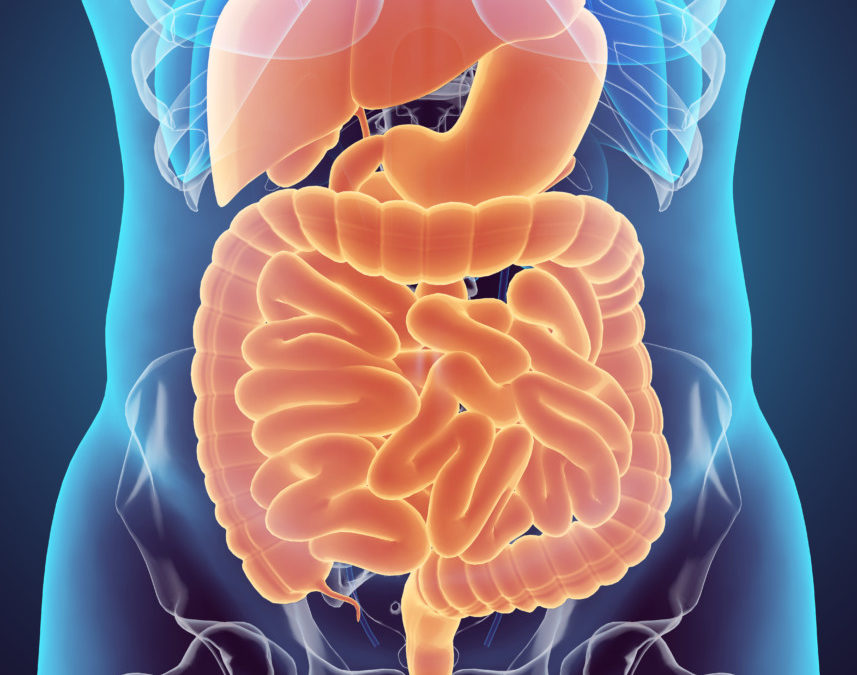What body system is at the center of any illness, symptom, diagnosis, happy moods, well-being, and vibrant health?
If you guessed the digestive system, then you nailed it! Digestive symptoms are strong clues that something isn’t right inside our bodies, and that our digestive system needs a little bit of extra attention. Things like constipation, heartburn, acid reflux, bloating, gas, and more are important message that are worthy of our attention.
Sometimes, this can seem a little bit confusing. You mean that digestion plays a key role in depression or anxiety? Or heart disease? Or Arthritis? The answer is yes. Here’s how.
Reason #1: Digestion is our Source of Needed Nutrients
A full spread of nutrients is needed for the body to do everything it does: power our muscles and brain so we can move and work, repair damage, detoxify any exposure to harmful substances, maintain appropriate levels of minerals and vitamins, and so on.
If shortages of nutrients become significant enough, function begins to break down. For example, if we don’t have enough B vitamins and antioxidants, such as vitamin A, C, and E, then we won’t be able to neutralize cell-damaging free radicals, because this clean up process require these nutrients.
Digestion is our source for these nutrients that power thousands of essential body functions every single day. If digestion is compromised, by hidden infections, inflammation from food sensitivities, previous antibiotic use or other medications, or other factors, it’s not too difficult to become deficient in important, necessary nutrients.
Interestingly, many of the nutrients we use are synthesized in our digestive tracts by the resident bacteria. If we have an imbalance of this microbiome, we may have a compromised ability to create and use certain nutrients.
Cleaning up the digestive system is super important, to make sure we are able to access all the nutrients we need from our food.
Reason #2: The Gut Has a Direct Communication Line to the Brain
The digestive system has a direct line of communication with the brain: the vagus nerve. When something goes wrong in the gut, say it gets invaded by a bacteria, the vagus nerve sends a signal to the brain that something is wrong, and this can affect our moods.
Have you ever heard the expression “I had a gut feeling”, or “I had butterflies in my stomach”? This is the gut-brain connection in action. How about the way in which nervousness can trigger diarrhea or nausea? Same thing.
There are lots of studies being published all the time showing how the composition of the gut microbiome has a profound affect of emotions and health. Balancing your microbiome is not only the key to decreasing digestive symptoms and making sure you can access and make important vitamins and other nutrients, it is also the key to promoting positive moods, and protecting your body from invading microorganisms.
The gut immune system is designed to protect us from hitchhiking bacteria, parasites, viruses, and fungus. If this system goes down, or is imbalanced, we are vulnerable to infection, imbalance, and all the downstream effects (see Reason #1).
80% of the immune system is centered in the gut, because besides our respiratory systems and reproductive systems, this is the place where we are daily exposed to outside influences. This means it is also the place where we have a lot of leverage to shift the terrain of our health.
Reason #3: Healthy Elimination Means Healthy Detox
Now we’re going to talk about the other end of digestion, which is elimination. Like I mentioned in Reason #1, our body uses lots of its nutrients to clean up and detoxify incoming pollutants.
In today’s day and age, we are constantly exposed to chemicals in the form of pesticides, herbicides, xenoestrogens, heavy metals, petrochemicals in air pollution, and many of us work in environments where we are exposed to other types of toxins.
Our liver does the heavy lifting here, using up all those antioxidants and B vitamins and amino acids to break the toxins down into water or fat-soluable parts that can then be eliminated by the kidneys in the urine, or by the bowel, in the stool.
But how many of us poop irregularly, or struggle with constipation? Ideally, we should be pooping 1-3 times per day, with ease. If you aren’t eliminating regularly, it’s likely you aren’t efficiently eliminating all those environmental toxins that your body is working so hard to break down. These toxins accumulate in the digestive system, and can affect the balance of the microbiome (see Reason #2), or are reabsorbed from the bowel, and can end up depositing into tissues in the body, and causing problems.
Making sure you are regularly eliminating is a super important part of supporting digestive health, and promoting overall health.
How do we make sure the digestive system is working well?
The first step is to remove any inflammatory foods. I always start my clients with removing gluten, diary, and sugar. If we need to identify other foods, we go deeper, but many people find that these three foods are actually contributing to digestive and deeper trouble.
The next step is to supply nutrients that may be deficient, to make sure the body can keep performing its essential functions of maintenance and detoxification.
Lifestyle habits regarding sleep, stress management, and exercise often need to be rearranged to support health, and improve and promote effective digestion.
Finally, if all these changes don’t resolve digestive or other challenges, we need to explore whether there may be hidden infections in the digestive system or elsewhere that need to be addressed.
Working through these steps provides powerful relief from many common symptoms, and even some diseases.
Who knew? Digestion holds the key to better health! What have you found that best supports your healthy digestion? Comment below!
